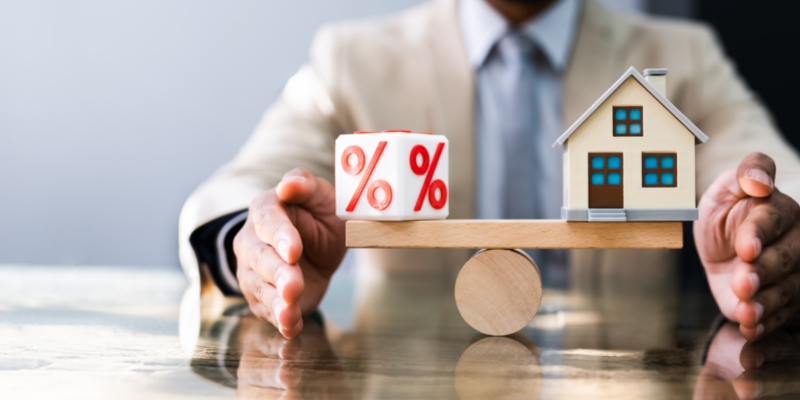Live you applying for a loan right now? Do you wish to discover if a variable or a fixed rate is better for your financial position? Making this choice might take a lot of work. Both variable and fixed-rate loans offer benefits, but it's crucial to thoroughly understand them before choosing one. To help you choose the loan choice that could be best for you, we'll break down both rates in this blog article and examine how they vary.
All about fixed-rate loans
 For the duration of the loan's payback period, rates of interest on fixed-rate loans remain constant. This implies that the cost of borrowing funds won't fluctuate with market changes and will remain the same for the loan.
For the duration of the loan's payback period, rates of interest on fixed-rate loans remain constant. This implies that the cost of borrowing funds won't fluctuate with market changes and will remain the same for the loan.
A fixed rate enables the borrower to make uniform monthly payments on an installment loan, such as a mortgage, vehicle, or school loan.
The 30-year fixed-rate mortgage is one of the most often used fixed-rate loans.
Because it enables them to plan and prepare for their payments, many homeowners select the fixed rate choice.
This shields clients against rising interest rates that may otherwise raise the cost of the loan, which is particularly beneficial for those with substantial but limited funds.
However, fixed-price loans can have a few drawbacks:
You lose the advantages of the lower rate if, indeed, the base interest rates fall. As an alternative, you'll keep paying the set rate.
Small company loans with fixed rates often have higher interest rates than loans with variable rates.
All about variable rate loans
Your small company may take loans using a variable-rate loan, which means the interest rate might go up or lower over time. For instance, if the base rate increases by 0.5%, your loan amount rate would increase from 8% - 8.5%. There are various benefits to variable-rate loans:
Loans with variable rates often have more affordable interest rates than fixed rates.
If the base rate declines, your lender may lower the interest rate on your small business loan, which will lower both the total amount due and your monthly payments.
There are various drawbacks to variable-rate loans:
The interest rate charged by your small business loan will increase as interest rates rise. This implies that your overall repayment sum and your tiny business's monthly bills will rise.
A rise in interest rates may affect your operating costs and budget when you have a limited cash flow.
What distinguishes student loans with fixed and variable interest rates?
The critical distinction between fixed and variable-rate student loan debt, like with other loans, is the way the interest rates charged on loans are established. Both government and commercial lenders provide fixed-rate college loans to borrowers taking out new loans or wanting to restructure their current debt.
Equal payments are the key advantage of fixed-price student loans. They are thus a fantastic choice for people who cannot pay off their loans fast or are unsure of their ability to find employment after graduation. Additionally, assuming market interest rates are predicted to climb, it is the better option.
Variable-rate loans, though, can be an excellent choice for you if market potential rates are down or you want to pay off your college loan as soon as possible after graduation. Rates for these loans, which are solely provided by private borrowers and based on the (London Interbank Offered Rate) Libor, sometimes begin lower than permanent loans and increase throughout the loan.
When choosing a variable college loan, it's critical to know if the interest rate will be capped or adjusted monthly, fortnightly, or both. This will determine the frequency of the monthly mortgage changes and your ability to manage them consistently.
Calculating the figures before reaching your final choice if you're trying to restructure your student loans is crucial. Although variable mortgages are a fantastic alternative for making aggressive repayments, choosing a fixed mortgage may result in little change in the interest rate.
Which mortgage, variable versus fixed rate, is preferable?

It varies, is the response. Take this into consideration to make the right choice for your circumstances:
- Is your company's cash flow particularly tight, and how big is your cash reserve?
- Do you desire stable monthly mortgage payments over the long term?
- Would a rise in your monthly obligations harm the sustainability of your company?
- Are you prepared to spend a little bit more of it in interest to feel more secure?
A fixed-rate loan is likely your best option if the response to these inquiries is "Yes."
If the following statements apply to your small company, a variable-rate loan may be a better option:
- Are you willing to forego part of the security of predictable payments in exchange for a little bit lower loan interest?
- Can the cash flow of your small company sustain more extended periods of higher payments?
- Can you consider the possibility of paying an unknown amount?
Final words
Shopping around for the finest loan for your needs is crucial before applying for one. You can encounter two sorts of loans: fixed-rate mortgages and variable-rate loans. Mortgages with fixed rates have an interest rate that remains constant throughout the loan, but those with variable rates might fluctuate based on the state of the market or other rules established by the lender. Which is better, then? What best meets your financial demands both now and in the future will ultimately determine.

Best Flood Insurance Companies

What is an Information Coefficient (IC)

What Age Is Best To Retire At, and Why

What Is Intermediate or Medium-Term Debt: A Comprehensive Guide 2023

Best Municipal Bond ETFs for Quarter Two of 2022

What is Timberland Investment

Difference Between a Citation and a Ticket

What is Walmart Money Card

Top-Rated Prepaid Credit Cards For Teenagers

Small Business Challenges

What Is Contractual Liability Insurance in General?
